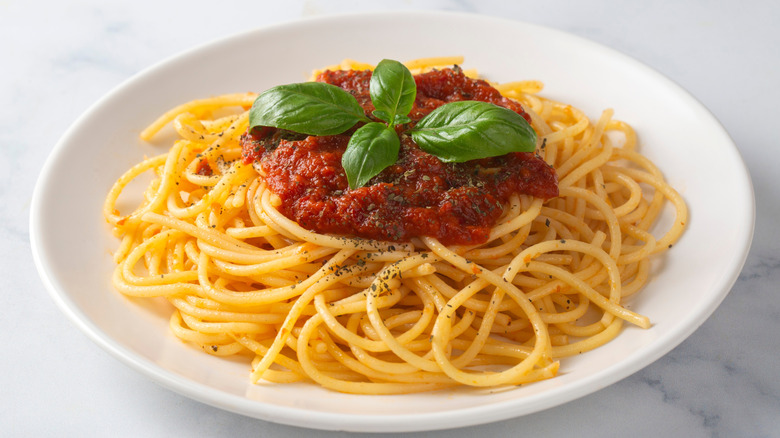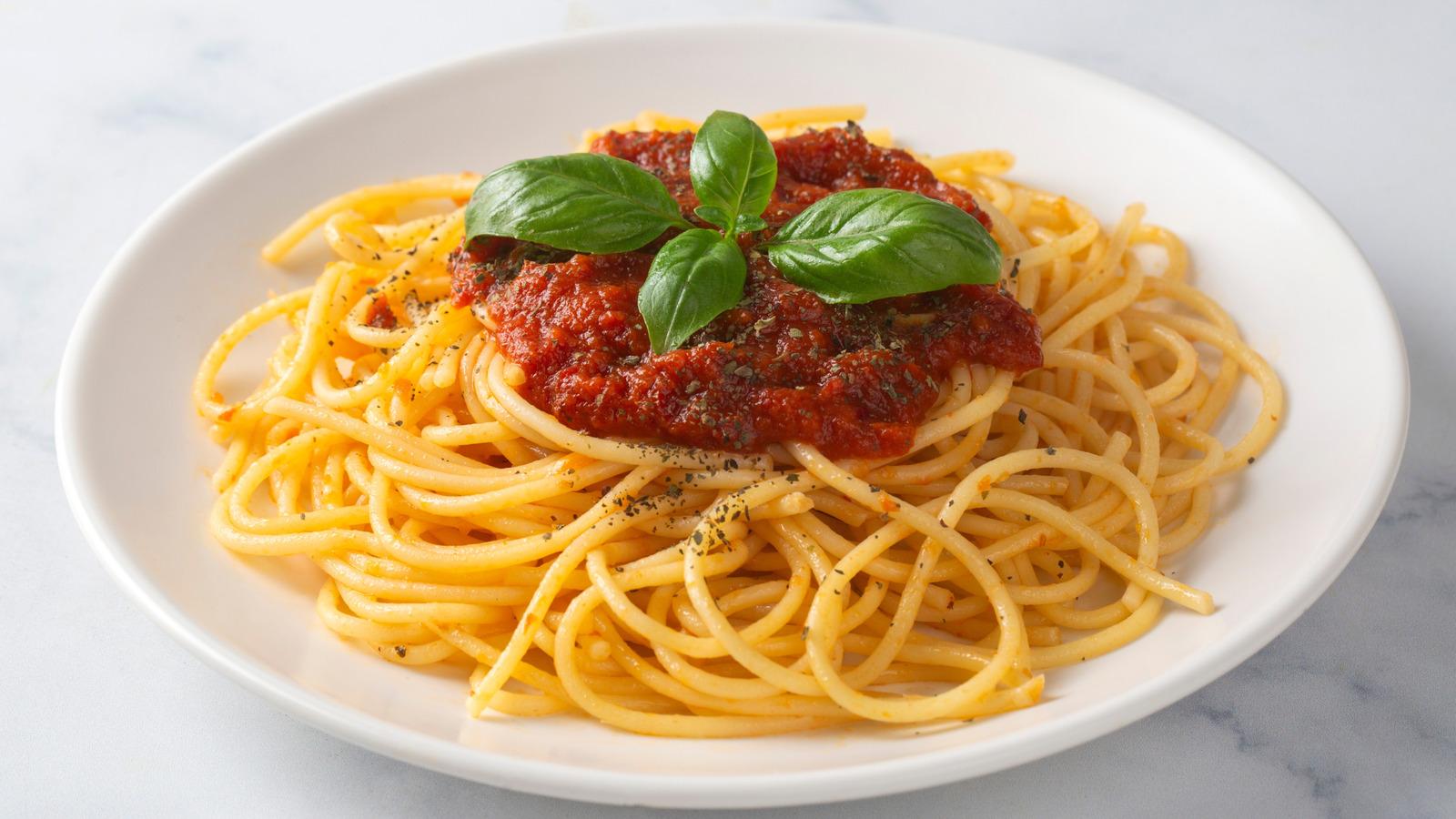
Esin Deniz/Shutterstock
Italian food always hits the spot, and is one of the most loved cuisines worldwide. Many major cities in the United States boast their own Little Italy. You can find them in Boston's North End neighborhood, Philly's Ninth Street Italian Market, and all the way across the country in San Diego. For a lucky few, dining options include expensive Michelin-starred Italian eateries like San Francisco's Acquerello. (Its four-course menu plus a wine pairing will set you back $260). However, most folks rely on more reasonably priced and accessible Italian restaurant chains to satisfy their hunger.
But in a market with so many dining options, staying afloat is challenging for a business. As of 2022, there were over 100,000 chain restaurants in the United States alone, according to IBIS World (via The Counter). Due to the pandemic and financial stressors going even further back, some of them — including Italian eateries — have struggled to keep their doors open. For some, closures and bankruptcy filings meant the business was doomed. But a lucky few have made a comeback by changing the way they operate and focusing on the customers. Some of the more noteworthy instances are Fazoli's, Olive Garden, Maggiano's Little Italy, Buca di Beppo, and Bertucci's.
Fazoli's
The first chain seeing comeback success is Fazoli's. Founded in Kentucky in 1988, the chain specializes in Italian fast food, including classic and baked pastas, pizza, and breadsticks. The storefronts function much like a traditional fast food joint with an ordering counter. Like any good fast food business, Fazoli's locations also have a drive-thru option so you can get your baked ziti and breadsticks on the go.
While the chain now flaunts over 190 locations in 26 states, there was a time when Fazoli's was struggling to stay in business. Its golden years were in the 90s, but by the late 2000s, the company started to shutter locations in many states. According to former CEO Carl Howard, its troubles were partly due to poor speed in stores and bad pricing. He even described the food as "terrible," citing watery Alfredo sauce and low-quality marinara as examples (via NRN). In Arizona, the last Fazoli's closed in 2008 and in Utah, the last storefront was closed by 2016.
But, the Fazoli's comeback is succeeding, thanks in part to its 2021 acquisition by FAT (Fresh. Authentic. Tasty) Brands Inc for $130 million and a complete upgrade of its food's quality. At the time, Fazoli's had just recorded a record year of growth — a 22% sales increase and an 18% traffic increase. In 2021, the chain added 64 locations, and in 2022 opened 20. More recently, FAT Brands announced a partnership that will bring Fazoli's to Canada. If things go to plan, in the next 10 years, 25 locations will open (the first in 2025).
Olive Garden
Another struggling chain restaurant that completely made a comeback is Olive Garden. It first opened its doors in Orlando in 1982 and by 1989 had exploded to 145 locations around the U.S. Olive Garden boasts Tuscan-inspired dishes and, of course, all you can eat breadsticks — which we ranked as the top Olive Garden side dish.
Yet in 2014, the chain experienced a decrease in profits and had halted plans to open new locations. In 2013, Olive Garden's parent company Darden announced plans to cut ties with Red Lobster (another of its restaurants). Investors did not feel the move was enough to spur growth and wanted separation from Olive Garden as well. Under pressure, the chain fully revamped its menu, updated its logo, remodeled restaurants, and introduced online and to-go ordering.
It appears this plan worked, and in the years since, Olive Garden has enjoyed growth and success. By 2018, the chain reported its best same-store sales in years and in 2023, Olive Garden achieved over $5 billion in yearly sales for the first time. Quarterly results released in June 2025 showed same-store sales up 6.9%. Rick Cardenas, CEO of Darden, attributed the success to the company's focus on keeping prices below inflation and consumers' preference for casual dining. Olive Garden recently added delivery services via an Uber partnership, which it hopes will encourage more growth.
Maggiano's Little Italy
The first Maggiano's Little Italy location opened in 1991 in Chicago, and has been serving classic Italian dishes ever since. There are now over 50 locations around the country, and Maggiano's was named America's Favorite Casual-Dining Chain in a 2019 study from Market Force Information (via Brinker International).
Since 2021, Maggiano's has reported positive same-store sales yet for almost two years has seen falling traffic. To combat this trend, its team has made changes and is taking cues from Chili's (also owned by parent company Brinker International). In 2022, Chili's new CEO boosted sales (up 30%) and traffic (up 20%) by simplifying its menu, offering value meals, and marketing it as a better deal than fast food.
In 2023, Maggiano's new CEO Dominique Bertolone opted to follow the same blueprint. The chain got rid of menu items and eliminated certain prep steps found to have little impact on overall guest experience. The goal is to focus on perfecting service on their core menu, but Bertolone also wants to "democratize luxury" for Maggiano's customers (via NRN). Former "Iron Chef" winner Anthony Amoroso was tapped to help introduce new innovative food and drink offerings for Maggiano's fall 2024 menu. New items include an Old Fashioned that comes in a smoked box, veal parmesan cut right at a customer's table, and a truffle and honey whipped ricotta.
Buca di Beppo
If you're a "Real Housewives of Beverly Hills" fan, you'll know Dorit Kemsley's Buca di Beppo design project (plus the ensuing drama). But it's probably more widely-known for serving family-style Italian favorites in a purposefully kitschy atmosphere. Buca di Beppo was born in 1993 in a Minneapolis basement — where its name (translating to "Joe's small place") comes from. Now, there are 40 locations around the country, the majority of which are on the west coast. Despite past popularity and presence in pop culture, the chain is currently trying to recover from financial struggles.
In 2024, Buca di Beppo filed for bankruptcy, citing pandemic-related financial hardship. The chain subsequently closed 30 restaurants and implemented other cost-saving measures. But, this was not enough to cover liabilities, which reportedly ranged between $10 and $50 million. Although owners blamed the pandemic, the chain had seen declining sales since 2014.
Mere months after the filing, the business was sold to its lender Main Street Capital for $27 million, and is trying to turn things around. Early in 2025, Main Street announced a partnership with Jackmont Hospitality to revive the chain. Like Olive Garden, Buca di Beppo is capitalizing on accessibility and now offers both curbside pickup and delivery options to reach more customers. Once-closed storefronts are starting to reopen in locations like San Diego. The chain is also attempting to attract customers with deals like its Feasts for Four, which offer salad and pasta for $40.
Bertucci's
Finally, we have Bertucci's — and buckle up, because this chain's journey is filled with twists and turns. Once very popular, its brick oven pizzas and piping hot rolls were a customer-favorite (and I can confirm this as a former Bertucci's roll enthusiast). First opened in Somerville, Massachusetts in 1981, Bertucci's stuck to its Boston-area roots for years. In the mid-90s, it expanded down the eastern seaboard to over 100 locations.
But by 2011, Bertucci's started to lose money, and in 2018, declared bankruptcy for the first of what would be three filings. In the first declaration, the company had racked up $120 million in debt and closed 15 storefronts. A few months later, Earl Enterprises bought Bertucci's for $20 million. Yet, trouble came again for the chain in 2022 when Bertucci's filed for bankruptcy again, this time citing the pandemic and inflation.
In April 2025, the brand declared bankruptcy a third time. In a statement, Bertucci's claimed it made the filing with the aim of "promptly reorganizing its business for a sustainable and successful future" (via CBS News). This future involves a shift to fast casual dining with the opening of a new Bertucci's Pronto concept store in Boston. The location will have a similar menu as its sit-down siblings while also offering breakfast and other on-the-go options like pizza by the slice. The company hopes that traffic, catering opportunities, and its status as a legacy brand will help it generate a projected $2 million annually.



